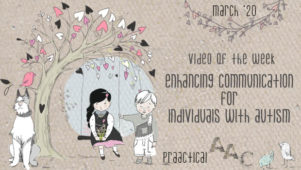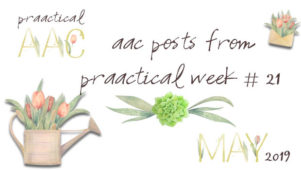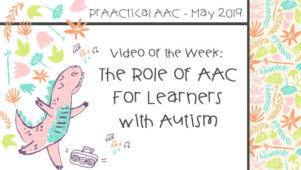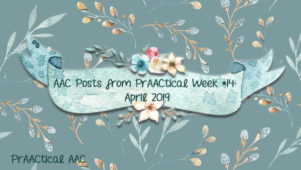30 PrAACtical Ideas for Celebrating Autism Awareness and Acceptance Month
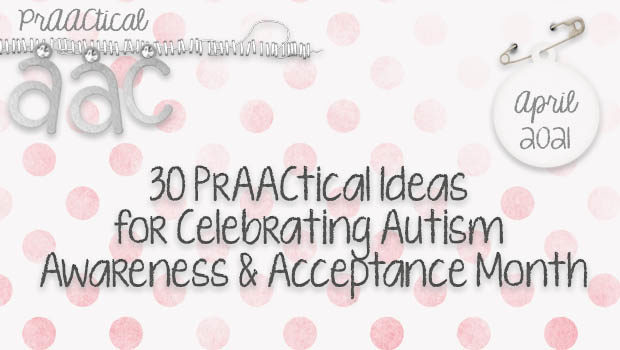
Looking for ways to celebrate Autism Awareness and Acceptance Month in ways that honor people with autism spectrum disorders? Here are a few suggestions.
- Get flappy with Julia and Abby from Sesame Street.
- Check out some new autistic YouTubers to follow.
- Focus on safety. Help families affected by autism take preventative action with this helpful kit.
- Attend, create, or volunteer at an event that is accepting of people with neurological differences. I’m a huge fan of The Friendship Journey and their Wings of Friendship Virtual Camp and Virtual Hangouts.
- Read autistic authors, like Alyssa Hillary Zisk, who also wrote a guest post here. You can get access to one of their recent works, AAC for Speaking Autistic Adults: Overview and Recommendations, co-authored with Elizabeth Dalton.
- Learn more about what makes a narrative a social story or comic book conversation as opposed to something else by reviewing the guidelines for sentence types (Click here).
- Take a ‘real look’ at a speech-language therapy session where the focus is coaching a family member to build play and interaction skills.
- Hire people with autism and/or buy their products.
- Learn more about neurodiversity.
- Introduce kids to videos featuring children with autism. Here are some suggestions to get you started.
- Share some resources in Spanish on autism support strategies from Joel Shaul.
- Consider the symbolism of images and metaphors used in conjunction with autism and drop those that do not align with your values. For example, despite their popularity, the use of ‘puzzle pieces’ is problematic for many people with autism and their families, as it depicts mystery and incompleteness.
- Strive to better understand how some people with autism experience meltdowns.
- Take action against restraint and seclusion in schools. Learn more here and here.
- Share some of the empirical supports for AAC use.
- Many autistic people have additional challenges or disabilities. Take a ‘real look’ at a family whose child has Down Syndrome and autism.
- Question your assumptions about autism. Articles like this one challenge us to rethink long-held assumptions about the lived experiences of autistic children and adults.
- Renew your commitment to theoretically sound and empirically supported approaches.
- Check out the Ed Wiley Autism Acceptance Library for some new reading material.
- Examine your vocabulary and purge it of terms like ‘low functioning,’ which are often viewed pejoratively.
- Enjoy Matthew’s communication journey with PECS, core vocabulary, and SGDs.
- Learn from some great online modules. Autism Internet Modules are excellent and free.
- Advocate for increased opportunities in supported employment.
- Learn more about ‘inspiration porn,’ how to avoid it in your own work, and how to combat it when you come across it.
- Think about supporting clients in the community.
- Think autism can’t be reliably detected before age 2? Explore some of the research by Dr. Amy Wetherby and her colleagues which suggests that children who don’t have a repertoire of 16 gestures by 16 months of age, they are at risk for ASD (click here).
- Help families prepare for summer by encouraging them to consider swimming lessons, then make some communication boards appropriate for the pool.
- Join Sesame Street’s Julia and Fluffster and practice mask-wearing using this fun video.
- Learn about and from self-advocates with ASD here (scroll down for the self-advocacy section). Listen to people with autism, and, when appropriate, amplify their messages.
- Celebrate someone with autism or an agency/program that serves them well. Show your gratitude for their presence and/or the fine work they do.
Do you have favorite ways to celebrate autism each April? We’d love to hear about them.
Filed under: Featured Posts, PrAACtical Thinking
Tagged With: ASD, autism acceptance month
This post was written by Carole Zangari

